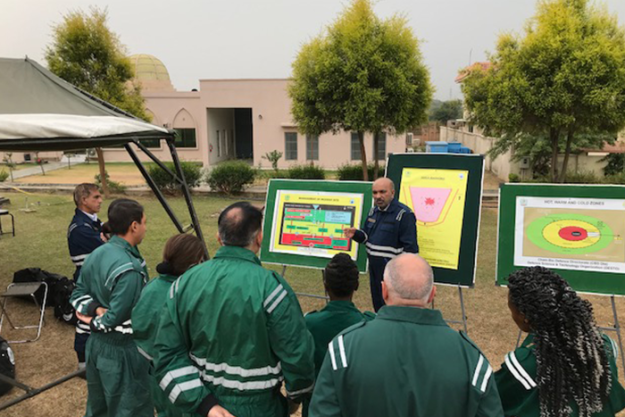
Experts from the Islamic Republic of Pakistan instruct international participants on contaminated scene operations
THE HAGUE, Netherlands — 24 November 2017 – The emergency response and protection capabilities of nine States Parties to the Chemical Weapons Convention (CWC) received a substantial boost as a new cluster of first responders wrapped up training at the 7th international advanced course on assistance and protection against chemical weapons, held in Islamabad, Pakistan from 13 – 17 November.
This advanced training was the second stage of a two-part capacity building course, run by the Organisation for the Prohibition of Chemical Weapons (OPCW) over the course of the year. While the first part of the course, held in Krusevac, Serbia in June, aimed at providing participants with best practices in chemical response, last week’s advanced course honed both their practical and theoretical capabilities.
The 12 participants who successfully completed this course will now join the ever growing group of trained professionals who are enhancing the safety and security of their respective countries.
“The knowledge conveyed in this training adds significant value to the protective capacity of those States Parties represented here,” emphasised OPCW Project Officer, Mr Guy Valente, addressing the course participants at the outset of the training. “Our hope is that you will pass on what you have learned and multiply the effect of the very competent instruction you receive from our hosts here in Pakistan.”
Topics covered during the training include: the use of protective equipment; monitoring, detection and decontamination operations in contaminated areas; and response to incidents involving chemical weapons and toxic industrial chemicals both during and after the event. These skills were refined during a field exercise that simulated circumstances surrounding a contaminated area and tested participants’ ability to launch an effective response operation.
The training was co-organised by the OPCW, the Pakistani Government’s Defence, Science and Technology Organisation, and the Chem-Bio Defence Directorate on behalf of the National Authority of the Islamic Republic of Pakistan.
Representatives of the following States Parties attended the training: Argentina, Brazil, Costa Rica, Kenya, Peru, Republic of Korea, Spain and Uganda.
Background
As the implementing body for the Chemical Weapons Convention, the OPCW oversees the global endeavour to permanently eliminate chemical weapons. Since the Convention’s entry into force in 1997 – with its 192 States Parties – it is the most successful disarmament treaty eliminating an entire class of weapons of mass destruction.
Ninety-six per cent of all chemical weapon stockpiles declared by possessor States have been destroyed under OPCW verification. For its extensive efforts in eliminating chemical weapons, the OPCW received the 2013 Nobel Prize for Peace.
